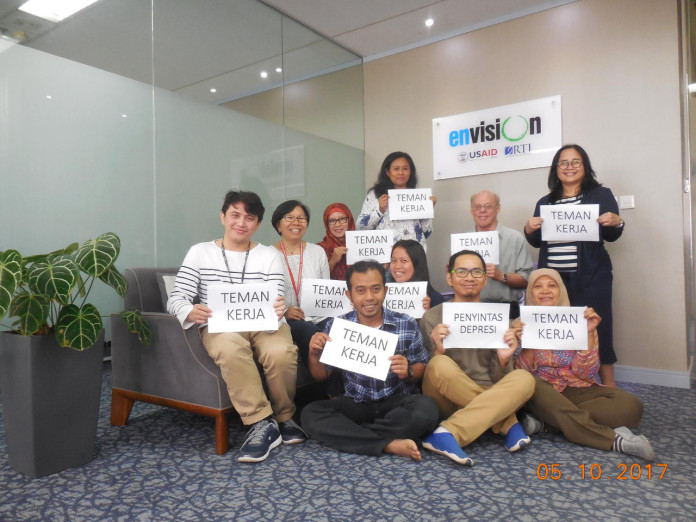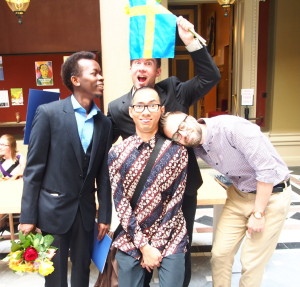
You might have read numerous happy, motivational articles on this platform. This is not one of those. This is a real talk, a slap to our head, a wake-up call to tell you that living and studying abroad are not always glitters and rainbows — and even if they are, what you see might not be the real condition, because depression is real and is lurking around the corner for some. Our brave survivor, Endri, shares his experience and takeaways from his struggle to remind all of us that depression is a disease, and like most diseases, there are things we can do to make it better — for ourselves and for others.
Most people visit Indonesia Mengglobal website to seek motivation and bits of advice to study abroad. It is rightly so, Indonesia Mengglobal is packed with success stories from Indonesian all over the world. I am also a regular visitor to this website. I can find excellent examples of a great essay to inspire me.
This article is different. This is a story about failures. This is a story about being fragile and vulnerable. Three years ago I attempted to take out my own life several times. The first was past midnight, just one day after my master’s degree graduation ceremony. Two Swedish police officers saved me by storming my apartment in the early morning. I did not have any academic problem. I was a bright student. I worked part-time to help first-year students on difficult courses. I also worked as a personal mentor to two students with special needs. I helped several classmates with their theses. Nevertheless, I suffered from a suicidal depression.
Depression is a disease. Depression is on a completely different level than a stress we commonly experience and complain about. Depression made me feel like I’m a failure, that nothing in this world means anything to me anymore. I felt extremely sad. I shut myself in my own apartment for weeks. I canceled any social gatherings I signed up to. I rejected all invitation to hang up. In another period, I felt numb. Nothing gave me joy anymore. Nothing. Not even a degree can make me smile.
I felt shame to reach out at that time. I was a chairman of Indonesian Student Association in Sweden. I was a cheerful bright student. Moreover, despite being a medical doctor, I didn’t know that what I experienced was a disease called depression. I thought it was just stress, or probably homesickness. I didn’t know I needed to cry for help. I didn’t know help was available. I didn’t know there is a treatment for depression. Thus, nobody knew about my pain and struggle.

This article is not to discourage you to pursue higher education in leading universities. Instead, I’m trying to convey a message that everyone breaks at some point in their lives. It’s hard to aware of it because we are living in a social media bubble. We are so used to seeing and posting happy memories only. Social media creates biased lives. It is as if it’s forbidden to post things which depict an unhappy life. It can be even worse if your circle of friends is loaded with scholarship awardees. It seems like as if we were competing to show off our academic and career achievements to the public, while pushing aside our struggle and keep it secret from anyone.
My experience with depression opened me to the world of mental health. I discovered that mental illness such as depression is very common, in particular for students living abroad. PhD students are in the higher risk group. I have, since, talked with hundreds of Indonesian students in all over the world who suffer from mental illness. Some are fellow survivors, some are still in a war with mental illness. Some common triggers are academic problems, love issues, and cultural adaptation problems. Some were caused by the long dark coldness of winter, known as winter depression. Yes, a lack of sunshine can cause depression. Most of them choose to keep it secret because talking about mental illness is such a difficult task. Some were so brave to see a doctor in a clinic. The experience of visiting a clinic blew them away. Everyone thinks they are the only one in the world who experience depression. Yet, the mental health clinic is never quiet. So many students seek help for their mental health problems. How come then we never hear about this at all?
It’s ok to ask for help. It’s ok to visit your campus clinic for a mental problem. It’s ok to talk about your pain. It’s ok to let your friends see your fragile side of you. Learn from my mistake. Don’t wait until police bang your door. I was lucky. A friend called the police when he sensed there was something with me. My two friends were not lucky. I lost them from suicide when they were studying abroad. You can’t read it in the news. Their parents did not want anyone to know that they died of suicide.
Talking about it is hard, extremely hard. I remember the first time I shared my story about my suicide attempt in Facebook. Some people thought it was fiction. Dude! However, that was not entirely their faults. For something people never talk about, I should have written a better post so that people would not misunderstand me. At that time, only those who had through depression period understood my FB post, and they did send private messages. There were fifty of them. Fifty! Fifty people in my Facebook circle had suffered from depression!
What if someone you know is having a hard time? I know most people will try to give advice, a solution to fix the problem. However, you can’t fix mental illness. Well, not the way you imagine it. You can’t say “pull yourself together” or “snap out of it”. If one can pull oneself together on him/herself, that’s not depression. The fact that one can’t pull it together qualifies it as depression. But you can help a friend to be someone who will listen. Be someone who will keep your friend accompanied during visits to a mental health clinic. Be someone who will call the police if you think your friend is in danger of committing suicide.
I have recovered from depression. It took me more than a year. However, I prefer to say I have made peace with my depression. I will leave you with a vlog featuring my former classmate who promptly called the local police station.
Many universities have a mental health clinic. Feel free to contact the clinic to make an appointment. Reach out for help. Keep people who can help you through this darkness. Despite you may feel hopeless, you are not the only one who has had to pass through this. You are not alone. There are people who care, but you need to let them know that you need help.
—————————————-
SUICIDE HOTLINES (if it’s not up-to-date, please contact the author or IM admin)
Albania: 127
Argentina: (54-11) 4758-2554
Australia: 13 11 14
Austria: 142
Barbados: (246) 4299999
Belgium: 106
Botswana: 3911270
Brazil: +55 51 211 2888
Canada – Greater Vancouver: 604-872-3311
Canada – Toll free-Howe Sound/Sunshine Coast: 18666613311
Canada – TTY: 1-866-872-0113
Canada – BC-wide: 1-800-SUICIDE (784-2433)
China: 0800-810-1117
China (Mobile/IP/extension users): 010-8295-1332
Croatia: (01) 4833-888
Cyprus: +357 77 77 72 67
Denmark: +45 70 201 201
Estonia (1): 126
Estonia (2): 127
Estonia (3): 646 6666
Fiji (1): 679 670565
Fiji (2): 679 674364
Finland: 01019-0071
France: (+33) (0)9 51 11 61 30
Germany (1): 0800 1110 111
Germany (2): 0800 1110 222
Germany (youth): 0800 1110 333
Ghana: 233 244 846 701
Greece: (0) 30 210 34 17 164
Hungary: (46) 323 888
India: 2549 7777
Ireland (1): +44 (0) 8457 90 90 90
Ireland (2): +44 (0) 8457 90 91 92
Ireland (3): 1850 60 90 90
Ireland (4): 1850 60 90 91
Israel: 1201
Italy: 199 284 284
Japan (1): 03 5774 0992
Japan (2): 03 3498 0231
Kenya: +254 20 3000378/2051323
Liberia: 06534308
Lithuania: 8-800 2 8888
Malaysia (1): (063) 92850039
Malaysia (2): (063) 92850279
Malaysia (3): (063) 92850049
Malta: 179
Mauritius: (230) 800 93 93
Namibia: (09264) 61-232-221
Netherlands: 0900-0767
New Zealand (1): (09) 522 2999
New Zealand (2): 0800 111 777
Norway: +47 815 33 300
Papua New Guinea: 675 326 0011
Philippines: 02 -896 – 9191
Poland (1): +48 527 00 00
Poland (2): +48 89 92 88
Portugal: (808) 200 204
Samoa: 32000
Serbia: 32000
Singapore: 1800- 221 4444
South Africa: 0861 322 322
Sweden (1): 020 22 00 60
Sweden (2): 020 22 00 70
Switzerland: 143
Thailand: (02) 713-6793
Ukraine: 058
United Kingdom (1): 08457 909090
United Kingdom (2): +44 1603 611311
United Kingdom (3): +44 (0) 8457 90 91 92
United Kingdom (4): 1850 60 90 90
United Kingdom (5): 1850 60 90 91
United States of America: 1-800-273-TALK (8255)
Zimbabwe (1): (263) 09 65000
Zimbabwe (2): 0800 9102









[…] Beating The Odds: A Real Talk on Depression and the Importance of Reaching Out […]
[…] son of two farmers who graduated from Columbia University, the life of deaf students in Rochester, to surviving depression as a student abroad, to the life of a mother who raises her little kid while pursuing study abroad. Why do this – […]